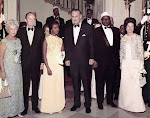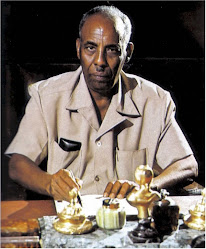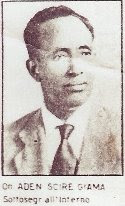 Addis Ababa — US president Barack Obama announced the death of Osama Bin Laden, the world's most wanted terrorist on Monday May 2, 2011. From 2001 to 2011 Bin Laden was a major target of the War on Terror, which has resulted in a total of between 80,000 and 1.2 million civilian deaths in Iraq, Afghanistan and Somalia.
Addis Ababa — US president Barack Obama announced the death of Osama Bin Laden, the world's most wanted terrorist on Monday May 2, 2011. From 2001 to 2011 Bin Laden was a major target of the War on Terror, which has resulted in a total of between 80,000 and 1.2 million civilian deaths in Iraq, Afghanistan and Somalia.The news was a relief for many people across the world including those who have suffered from al-Qaida's indiscriminate killings and injuries in the Horn of Africa.
Both Bin Laden and his terrorist organisation, al-Qaida, have historical links to the Horn of Africa region. Osama Bin Laden actually became one of the world's most wanted terrorists when he resided in Sudan from 1991 up to 1996. During this period, al-Qaida established connections with other terrorist organizations with the help of its Sudanese hosts and Iran.
While Bin Laden was in Sudan, Al-Qaida was involved in several terror attacks, including the bombing of two hotels in Aden, Yemen, where the main targets were American troops en route to Somalia on a humanitarian and peace keeping mission. Al-Qaida also gave massive assistance to Somali militias whose efforts resulted in the eventual withdrawal of U.S forces in 1994. In addition, Osama bin Laden is also linked to the assassination attempt against former Egyptian president Hosni Mubarak in Ethiopia in June 1995.
It can be argued that Al-Qaida has had greater success in the Horn of Africa than in any other part of Sub-Saharan Africa because of the relative proximity to the Middle East, the presence of a large Muslim community and the region's relative instability, particularly in Sudan and Somalia.
In August 1998, an Al-Qaida group carried out bomb attacks on the US embassies in Nairobi, Kenya, and in Dar es Salaam, Tanzania. The two terrorist attacks resulted in the deaths of over 220 people, mainly Africans, and more than 5000 injuries. Moreover, Al-Qaida bombed an Israeli owned hotel in Mombasa Kenya in 2002 and killed 15 people. On the same day, two missiles narrowly missed a chartered Israeli Arkia Boeing 757 carrying 261 passengers on take-off from the Mombasa airport.
After the hotel bombings, the US opened a joint operation with its allies in the region to capture the terrorists involved. However, most of the suspects fled to Somalia where its lack of government and virtual collapse made the country a relatively safe haven for many international terrorists.
Since 2000, exiled al-Qaida terrorists in Somalia have established strong links with warlords and different religious leaders in the country. They were also the main architects of the formation of the Union of Islamic Courts (UIC), the group that gained control of Mogadishu in 2006. The UIC was composed of eleven autonomous religious courts in Somalia.
The mastermind behind this group was Hassan Dahir Aweys, wanted by the U.S. government for involvement in al Qaida activities. Aweys and his allies shrewdly co-opted indigenous Islamist movements for their own criminal purposes under the guise of restoring order to Somalia. Aweys' ties to Somali terrorists goes back to the early 1990s, when he was part of the al Qaida-backed United Islam (al-Ittihad al-Islamiya), the predecessor of the Islamic Courts Union (al-Ittihad Mahakem al-Islamiya).
The rise of extremism in Somali politics has become a threat for not only the U.S and Europe, but also for neighboring African countries, especially those with a large Somali population such as Ethiopia and Djibouti. In 2006 al-Qaida inspired the UIC to declare Jihad against Ethiopia for its support for the weak Transitional Federal Government (TFG) in Somalia that is backed by the international community. In December 2006, at the invitation of the TFG, Ethiopian troops invaded Somalia and eventually captured the capital, Mogadishu, driving the UIC from power.
However, after the withdrawal of Ethiopian troops in December 2008, al-Qaida linked Islamists joined Al Shabaab to recapture many parts of Somalia, including parts of the city of Mogadishu. The threat posed by Al Shabaab was not limited to Somalia. An illustration of its regional reach was demonstrated by the 7/11 bombings in Kampala, Uganda in July 2010, where more than 75 civilians were killed and many more were injured. Additionally, in January 2010 the group admitted its affiliation with al-Qaida when it declared that the jihad in the Horn of Africa must be combined with the international jihad led by the al-Qaeda network. On 2 May, 2011 an Al-Shabaab spokesperson threatened revenge attacks for Bin Laden's death.
"The Americans have previously killed other Islamist leaders ... (whose) students will continue the jihad and we shall retaliate against the Americans, Israel, Europe and Christians in Somalia with destructive explosions," said Mohamed Osman Arus.
On the other hand, many governments in the Horn of Africa are hailing the death of Osama Bin Laden. The Kenyan president, Mwai Kibaki, described bin Laden's death as "an act of justice", whereas his Ugandan counterpart described the terrorist's death as a "momentous event". On 4 May, a security advisor for the Prime Minister of Ethiopia, Tsegay Berhe, noted that Osama Bin Laden's death also weakens Al Shabaab.
However, when we look at the impact of Bin Laden's death in the Horn of Africa; psychologically it is a big blow for many terrorist organizations including Al Shabaab and Hizbul Islam. The Navy Seals eliminated an iconic figure from which such organizations have drawn inspiration and symbolism. What Bin Laden represented for Al Shabaab and other terrorist groups has been largely diminished as a result of his death.
These groups may try to undertake further terrorist attacks, particularly in Kenya, Uganda and Ethiopia, countries that are widely perceived by such groups to be supportive of the U.S government. If they should try to do so, their purpose will include the need to avenge the killing of Osama Bin laden and to show the world that they have the will and capability to damage the stability and security of the Horn of Africa.
However, the impact of Bin laden's death on Al Shabaab, both ideologically and operationally, is far from clear. It is difficult to gauge because these groups have never maintained formal organizational links with al-Qaida. Most of their leaders are local people who have strong anti-American sentiments and merely drew inspiration from Osama bin Laden.
Perhaps, in ideological terms at least, they will continue to follow and draw from the narrative and ideology that al-Qaida and their late leader established during the past decade or more. Yet, it cannot be doubted that the global leadership void that Bin laden's death has left will in time temper both the ideology and operational capability of Al Shabaab.
One can never be entirely certain, but we can hope that the Horn of Africa and perhaps the world will be relatively more peaceful, now that Osama Bin Laden is dead.
Abele Abate is an intern in the African Conflict Prevention Programme of the ISS, based in Addis Ababa. Special thanks to Solomon A. Dersso and Berouk Mesfin.
Beware, Osama's heirs are still as dangerous



.jpg)











No comments:
Post a Comment